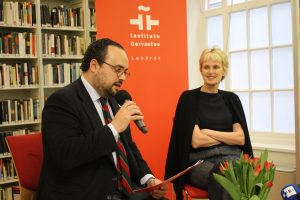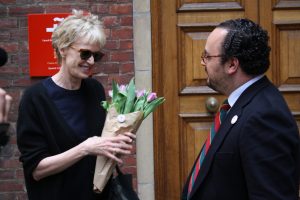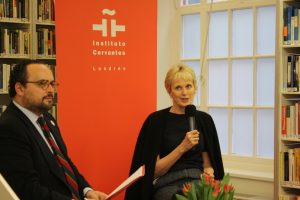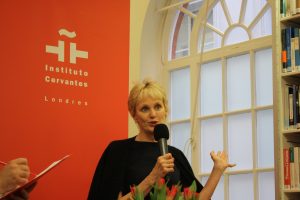Siri Hustvedt: El Premio Princesa de Asturias más feminista, ético y dickensiano
La escritora Siri Hustvedt, Premio Princesa de Asturias de las Letras 2019, aseguró ayer que la concesión del galardón es “una mezcla de gratitud, sorpresa y felicidad”, en una rueda de prensa celebrada en el Instituto Cervantes de Londres, ciudad en la que se encuentra promocionando su novela más reciente.
El Jurado del Premio Princesa de Asturias de las Letras 2019, reunido en Oviedo, acordó conceder el galardón a la escritora estadounidense y destacó su obra como “una de las más ambiciosas del panorama actual de las letras. Incide en algunos de los aspectos que dibujan un presente convulso y desconcertante, desde una perspectiva de raíz feminista. Y lo hace desde la ficción y el ensayo, como una intelectual preocupada por las cuestiones fundamentales de la ética contemporánea”.
Traducida a más de treinta idiomas, Hustvedt confesó que tuvo que esperar unas cuantas horas hasta que llamó a su marido, el escritor Paul Auster, residente en Estados Unidos y galardonado con el mismo premio en 2006, para asegurarse de que no le iba a despertar: “Estaba muy feliz y siento que hay algo maravilloso en que le den el premio a alguien en la misma familia. Los dos estamos muy agradecidos, yo lo estuve en su día, fue un placer verle recibir este premio y sé con seguridad que él siente lo mismo ahora”.
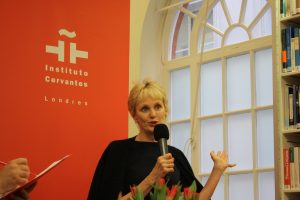
La estadounidense toma el testigo de otros escritores como Fred Vargas, Adam Zagajewski o Richard Ford y confirmó que asistirá a la ceremonia de entrega de los Premios Premio Princesa de Asturias en el Teatro Campoamor de Oviedo este otoño.
En su intervención en el centro cultural español, Hustvedt destacó el papel y la necesidad del feminismo a lo largo de los siglos, remontándose al ejemplo del texto escrito por Christine de Pizan en el siglo XIV contra la misoginia. “Las olas de feminismo reaparecen, creo que a veces lo hacen en conexión con este choque que vemos con el populismo, profundamente presente en Estados Unidos y también en España, como se ha podido comprobar en las últimas elecciones, así como en Alemania y el Este de Europa”.
Para Hustvedt, está claro que se necesita el feminismo porque la “historia no ha terminado” y también porque para ella es una forma de humanismo. Para la escritora, “las mujeres, las personas que no se identifican ni como hombres ni como mujeres, se sienten liberadas con las ideas del feminismo».
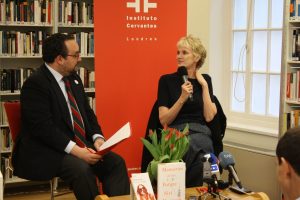
“Es un privilegio haber acogido a tan gran escritora en uno de los días más importantes de su carrera. El Premio Princesa de Asturias es uno de los mayores premios literarios del mundo y estamos encantados de tener con nosotros a una escritora clave en la escena contemporánea”, aseguró el director del Instituto Cervantes de Londres, Ignacio Peyró.
Hustvedt, que viajará en los próximos días a Manchester, a Bath, y al festival literario de Hay, recordó la figura del escritor británico Charles Dickens, sobre el que escribió su tesis doctoral en la universidad. “Mi pasión por Dickens se remonta a muchos años antes, a cuando tenía 13 años y leí David Copperfield, y fue esa novela la que me hizo leer otras. Dickens tiene un lugar muy profundo en mi vida, pero incluso se remonta a mi abuela noruega, que leía a Charles Dickens en noruego una y otra vez, él era su escritor favorito”, admitió.
Siri Hustvedt, the most feminist, ethical and Dickensian writer is awarded Princess of Asturias Award for Literature
American writer Siri Hustvedt, recipient of the Princess of Asturias Award for Literature 2019, said that the recognition was «a mixture of gratitude, surprise and happiness» at a press conference held at the Cervantes Institute in London, a city where ahe is promoting her most recent novel.
Hustvedt (Minnesota, United States, 1955) began the press conference by mentioning her father, who said that «grace is not something you deserve or that you have necessarily earned. The correct answer to grace is gratitude.»
The Jury for the Princess of Asturias Award for Literature 2019, meeting in Oviedo, Spain, said that Hustvedt’s work is one of the most ambitious on today’s literary scene. Employing a feminist perspective, she addresses a variety of facets that sketch a convulsive, disconcerting present.
Translated into more than thirty languages, Hustvedt is a scholar and intellectual who addresses the fundamental issues of contemporary ethics and epistemology. As well as being known for her feminist militancy, her work has contributed to interdisciplinary dialogue between the sciences and the humanities. She has published essays and articles in academic and scientific journals, including Contemporary Psychoanalysis, Seizure: European Neuropsychoanalysis and Clinical Neurophysiology.
The writer takes the baton from recent award winners, such as Fred Vargas, Adam Zagajewski or Richard Ford. Hustvedt confirmed that she will attend the award ceremony of the Princess of Asturias Award at the Campoamor Theater in Oviedo this autumn.
In her speech at the Instituto Cervantes in London, Hustvedt highlighted the role and need of feminism over the centuries, quoting the example of the text against misogyny written by Christine de Pizan in the 14th century. «The waves of feminism reappear, I think sometimes they do in connection with this clash we see with populism, deeply present in the United States and also in Spain, as we have been seen in the past elections, as well as in Germany and the East of Europe».
For Hustvedt, it is clear that feminism is needed because «history is not over» and also because for her it is a form of humanism. Furthermore she said «women, people who do not identify as either men or women, feel liberated with the ideas of feminism.»
«It is a privilege to have hosted such a great writer on one of the most important days of her career. The Princess of Asturias Award is one of the greatest literary awards in the world and we are delighted to have a key writer in the contemporary scene with us,”, said Ignacio Peyró, director of the Instituto Cervantes in London.
Hustvedt will travel to Manchester in the coming days, to Bath, and to Hay’s literary festival. She recalled the figure of the British writer Charles Dickens, on whom she wrote her doctoral thesis at university. «My passion for Dickens goes back many years before, when I was 13 and I read David Copperfield. It was that novel that made me read others. Dickens has a very deep place in my life, but it even goes back to my Norwegian grandmother, who read Charles Dickens in Norwegian over and over again. He was her favourite writer,” she admitted.
